Otizm ve Özgül Öğrenme Güçlüğü tanısı almış çocukların sağlıklı kardeşlerinin psikolojik uyumu, kardeş ilişkileri ve algıladıkları anne kabul-reddi: Otizm, Özgül Öğrenme Güçlüğü ve Kardeş İlişkileri
Psychological adjustment, sibling relationships and perceived maternal acceptance-rejection of healthy siblings of individuals with Autism and Specific Learning Disabilities: Autism, Specific Learning Disability, and Sibling Relationships
Author(s): Esra Angın, Gülsen ErdenSubject(s): Social Sciences, Psychology, Clinical psychology, Inclusive Education / Inclusion
Published by: Klinik Psikoloji Araştırmaları Derneği
Keywords: siblings; sibling relationship; autism; ASD; specific learning disability; perceived parental acceptance-rejection; psychological adjustment;
Summary/Abstract: The main aim of this study was to examine the potential differences in terms of perceived maternal acceptance-rejection, psychological adjustment, and sibling relations between healthy children aged 9-17 years who have siblings diagnosed with Autism Spectrum Disorder (ASD) or Specific Learning Disabilities (SLD) and who do not have siblings with neurodevelopmental disabilities. The sample of the study consisted of 138 children between the ages of 9-17. Sixty of the participants (43.5%) were male, and 78 (56.5%) were female. While 92 of the participants’ siblings had a diagnosis of ASD or SLD, 46 didn’t have any neurodevelopmental disability. Multivariate analysis of variance (MANOVA) was used to analyze the data to examine whether perceived maternal acceptance-rejection, psychological adjustment, and sibling relationships differ according to the gender of the participants and the diagnosis status of their siblings. According to the gender of the participants, it was found that girls perceived their mothers more rejecting, while boys experienced hostility and negative self-efficacy significantly in their psychological adjustment and described their relationships with their siblings as more conflicting. In addition, the dimensions of perceived maternal acceptance ‘warmth,’ ‘neglect,’ and ‘control’ differ significantly with the diagnosis of their siblings. Furthermore, the ‘warmth’ of sibling relationships, competition, self-positioning, and conflict differ significantly depending on the diagnosis status of the siblings of the participants. With this study, directive and holistic information were provided about workshops and programs for the needs of individuals with disabled siblings that might vary in terms of their gender and developmental stages.
Journal: Klinik Psikoloji Dergisi
- Issue Year: 6/2022
- Issue No: 1
- Page Range: 123-141
- Page Count: 19
- Language: Turkish, English

